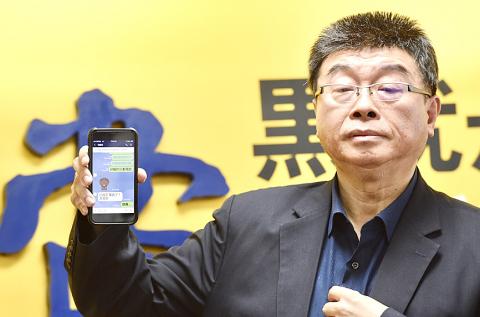Former president Ma Ying-jeou’s (馬英九) office yesterday said that he is considering a defamation lawsuit against former Chinese Nationalist Party (KMT) legislator Chiu Yi (邱毅), who claimed that he was removed from the party’s list of legislator-at-large nominees because of Ma.
In an interview with Hong-Kong based China Review News Agency published yesterday, Chiu said that he had initially been included in the list due to recommendations by former vice president Lien Chan (連戰), former KMT legislator Hung Hsiu-chu (洪秀柱), Deputy Kaohsiung Mayor Yeh Kuang-shih (葉匡時) and retired army general Hsu Li-nung (許歷農).
However, in a meeting of the KMT’s seven-person review committee, KMT Vice Chairman Tseng Yung-chuan (曾永權), who led the panel, removed Chiu from the list to make room for former Presidential Office spokesman Charles Chen (陳以信) and Taiwan Institute of Zhongyuan Development secretary-general Che Yi-ching (車宜靜), Chiu said.

Photo: Peter Lo, Taipei Times
Chiu quoted Tseng as saying that Ma had recommended Chen and Che.
He was later reintroduced to the list after he and several party members objected to his removal, he said.
However, he decided to withdraw from contention due to continuous criticism by the Democratic Progressive Party over his pro-China stance, Chiu said, adding: “I do not want to see [KMT Chairman] Wu Den-yih (吳敦義) under fire because of me.”
Chiu’s inclusion in the list was controversial due to his remarks earlier this year that peaceful cross-strait unification would be possible once leading pro-Taiwanese independence advocates are “decapitated,” citing former presidents Lee Teng-hui (李登輝) and Chen Shui-bian (陳水扁), President Tsai Ing-wen (蔡英文), former premier William Lai (賴清德) and Presidential Office Secretary-General Chen Chu (陳菊).
Ma’s office said in a statement that he had not recommended any nominees, because KMT regulations forbid former chairpersons from doing so.
Tseng has also denied saying at the meeting that Chen and Che were recommended by Ma, it said.
Chiu — who has now been included in the New Party’s list of legislator-at-large nominees — is intentionally trying to cause divisions within the KMT, Ma’s office said.
Ma would consider a lawsuit if Chiu continues to make false claims about him, it said.
The KMT said in a statement that Tseng did not remove Chiu from the list and that Che was not recommended by Ma.
KMT legislator-at-large nominees were selected in a careful, fair and transparent manner, it added.

Intelligence agents have recorded 510,000 instances of “controversial information” being spread online by the Chinese Communist Party (CCP) so far this year, the National Security Bureau (NSB) said in a report yesterday, as it warned of artificial intelligence (AI) being employed to generate destabilizing misinformation. The bureau submitted a written report to the Legislative Yuan in preparation for National Security Bureau Director-General Tsai Ming-yen’s (蔡明彥) appearance before the Foreign Affairs and National Defense Committee today. The CCP has been using cognitive warfare to divide Taiwanese society by commenting on controversial issues such as Taiwan Semiconductor Manufacturing Co’s (TSMC, 台積電) investments in the

INVESTIGATION: The case is the latest instance of a DPP figure being implicated in an espionage network accused of allegedly leaking information to Chinese intelligence Democratic Progressive Party (DPP) member Ho Jen-chieh (何仁傑) was detained and held incommunicado yesterday on suspicion of spying for China during his tenure as assistant to then-minister of foreign affairs Joseph Wu (吳釗燮). The Taipei District Prosecutors’ Office said Ho was implicated during its investigation into alleged spying activities by former Presidential Office consultant Wu Shang-yu (吳尚雨). Prosecutors said there is reason to believe Ho breached the National Security Act (國家安全法) by leaking classified Ministry of Foreign Affairs information to Chinese intelligence. Following interrogation, prosecutors petitioned the Taipei District Court to detain Ho, citing concerns over potential collusion or tampering of evidence. The

‘COMPREHENSIVE PLAN’: Lin Chia-lung said that the government was ready to talk about a variety of issues, including investment in and purchases from the US The National Stabilization Fund (NSF) yesterday announced that it would step in to staunch stock market losses for the ninth time in the nation’s history. An NSF board meeting, originally scheduled for Monday next week, was moved to yesterday after stocks plummeted in the wake of US President Donald Trump’s announcement of 32 percent tariffs on Taiwan on Wednesday last week. Board members voted to support the stock market with the NT$500 billion (US$15.15 billion) fund, with injections of funds to begin as soon as today. The NSF in 2000 injected NT$120 billion to stabilize stocks, the most ever. The lowest amount it

NEGOTIATIONS: Taiwan has good relations with Washington and the outlook for the negotiations looks promising, Minister of Economic Affairs J.W. Kuo said Taiwan’s GDP growth this year is expected to decrease by 0.43 to 1.61 percentage points due to the effects of US tariffs, National Development Council (NDC) Minister Paul Liu (劉鏡清) said at a meeting of the legislature’s Economics Committee in Taipei yesterday, citing a preliminary estimate by a private research institution. Taiwan’s economy would be significantly affected by the 32 percent “reciprocal” tariffs slapped by the US, which took effect yesterday, Liu said, adding that GDP growth could fall below 3 percent and potentially even dip below 2 percent to 1.53 percent this year. The council has commissioned another institution